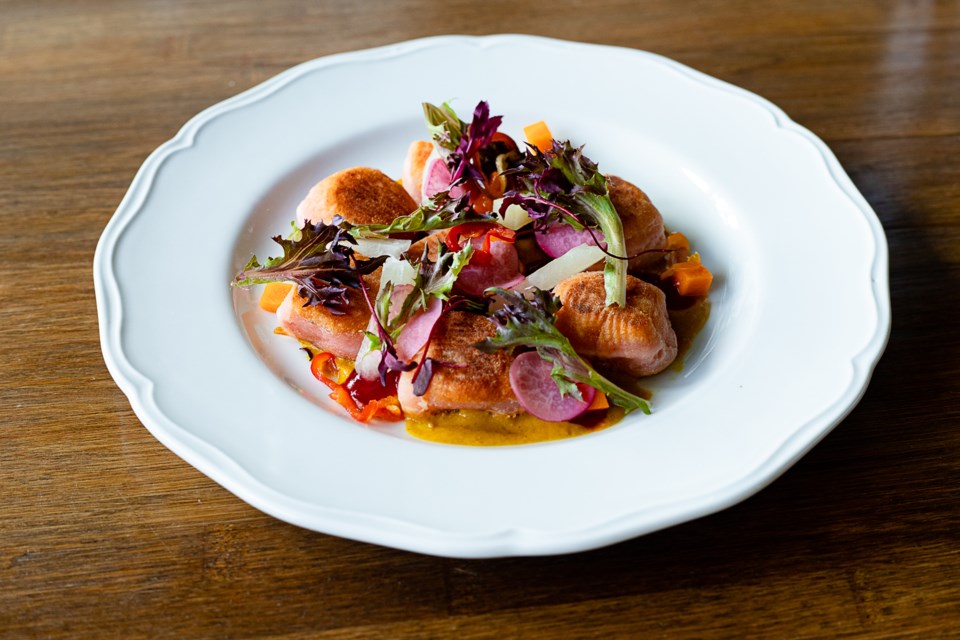Whether it’s a fine dining establishment, food hall, food truck or fast food joint, restaurants have the power to nourish your body and your soul. They can transport you back home, send you on vacation and remind you of that person who is no longer with us. And they supply nourishment to those who do not have the time, inclination or ability to cook. Dining out in North Texas is as much about culture as it is about necessity.
And when dietary restrictions are introduced into the mix, it can leave people who need or choose to eat in a certain way with a complicated set of challenges.
The spectrum of those who eat a specialized diet is vast, highlighting the incredible diversity, flexibility and lack of flexibility in this category. It ranges from those with severe food allergies, autoimmune diseases and chronic illnesses with little room for error to those who have chosen to experiment with elimination diets or live an encompassing lifestyle, like veganism. This makes the best kind of relationship between restaurants and diners on this spectrum a symbiotic one.
In order for restaurants to meet certain dietary requests, the essentials of hospitality must be established. And no one understands this better than Rich Vana, the chef and owner of the Heritage Table in Frisco. Located inside a charming and historic standalone home in the heart of the Rail District, Vana keeps his supply chain impressively short and operates an investive hospitality experience. “My first priority as a chef is hospitality,” says Vana. “The second is to promote responsible eating habits.”
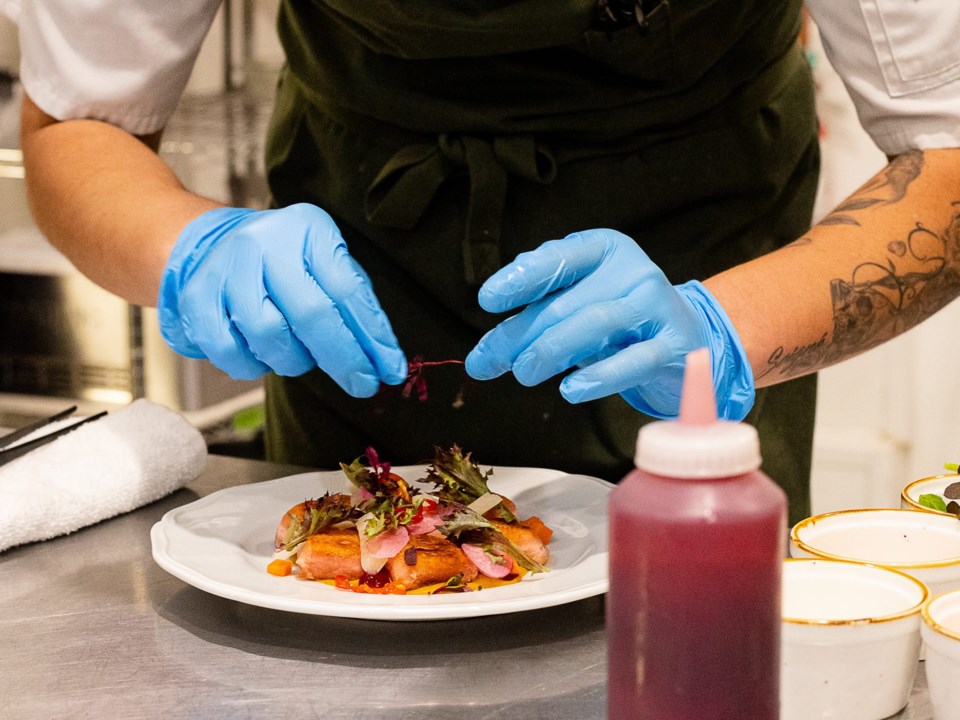
Sauté cook, Will Perez plating the vegan roasted beet gnocchi at The Heritage Table. Photography by Sher Castellano
Vana’s menu is succinct, yet creative and diverse, and changes seasonally. “After our server greets the table, they will ask if there are any food allergies or restrictions,” he says. “And the most common requests are for gluten-free and dairy-free accommodations.” Not only is it a pleasure for Vana to fulfill the needs of his diners, but he also makes it seem effortless. After all, when service is your biggest priority, your menu is built on quality and your staff is highly knowledgeable, it might look easy. But it’s not.
As defined by the CDC, a food allergy occurs when the body has a specific and reproducible immune response to certain foods. In the United States, allergies affect 11% of adults and 8% of children, with the prevalence increasing by 50% between the periods of 1997-1999 and 2009-2011. While the increase in diagnoses is perplexing, there are many theories to explain this, and legislative bodies, medical communities and scientists are concerned — after all, food is vital to survival. And even when hospitality is the main goal, there are restaurants that struggle to get the basics of food allergy safety right.
In 2004, Congress passed the Food Allergen Labeling and Consumer Protection Act (FALCPA), which was the first of its kind. It identified eight major food allergens: milk, eggs, fish, crustacean shellfish, tree nuts, peanuts, wheat and soybeans. This law required packaged food manufacturers to declare allergens in their ingredient lists. To keep up with emerging science, President Biden signed the Food Allergy Safety, Treatment, Education and Research Act (FASTER) of 2021 into law. FASTER includes a ninth allergen, sesame, and simplifies the process for labeling new allergens as they emerge. It also expands the research needed to find new food allergy treatments.
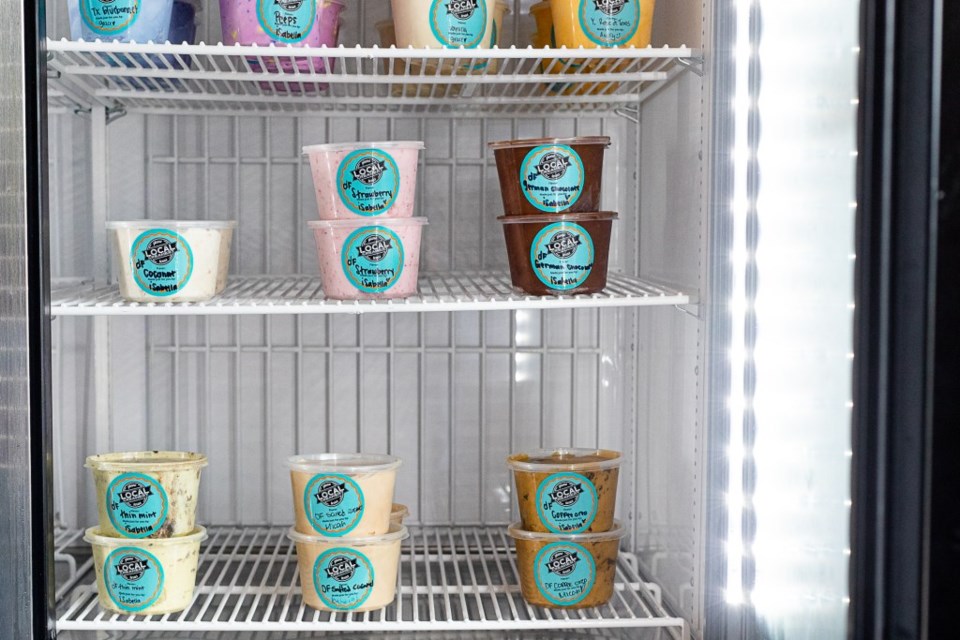
Takeaway dairy-free pints in Local Creamery’s Grab-n-Go freezer. Photography by Sher Castellano
While the federal government has acted to raise food allergy awareness, neither FALCPA nor FASTER federally requires restaurants to display allergen information or disclose the use of the nine most common food allergens to their customers. Currently, in Texas, there are no state laws that require restaurants to provide allergen training to their employees or allergen information to their diners. However, in January 2023, Texas state Democrats introduced Texas House Bill 1445, which relates to food allergen awareness in food service establishments, food manager certifications and food service programs. The bill was put into motion after Sergio Alexander Lopez of McAllen died after unknowingly ingesting peanut butter at a restaurant, despite checking with employees to ensure the food was safe to eat.
The goal of Texas HB1445 is to better help food service employees understand how to serve people with food allergies more safely. It would require food training programs, manager certification exams and a public display of allergen information. The legislators proposing the bill believe this would not only reduce the risk of costly allergic reactions but also help prevent avoidable deaths.
Brooke and Lane Bauer’s daughter couldn’t believe it when her parents started an ice cream shop. But the Bauers, co-owners of Local Creamery in Plano, assured their daughter, who has a dairy allergy, that they would make sure she could have a real going-out-for-ice-cream experience like everyone else — something they took very seriously.
The Baurers were inspired to open Local Creamery after enjoying the best ice cream of their lives while vacationing off the coast of Belize on the island of Ambergris Caye. After spending the pandemic perfecting their ice cream formulas, they opened in July of 2022. They settled on two base versions, classic and dairy-free ice cream — both free of gluten, nuts (contains coconut) and artificial colors and dyes (inspired by their son, who is on a dye-free diet).
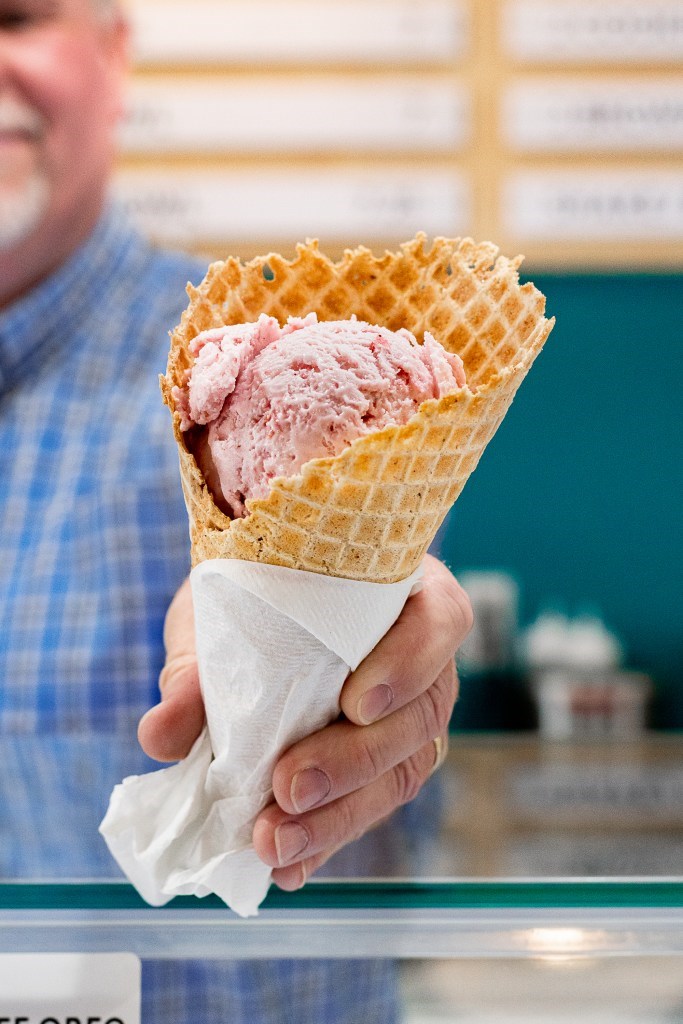
Co-owner Lane Bauer serving up DF Strawberry in a gluten-free, vegan waffle cone. Photography by Sher Castellano
But in order to keep the classic base separate from the dairy-free base, there are strict procedures in place, including separate ice cream scoops and thorough cleaning practices. Even their gluten-free, vegan waffle cone is made on a dedicated iron that doesn’t come into contact with the waffle cone that contains wheat. “We have customers break down into happy tears when they come to visit for the first time,” says Brooke Bauer. “They just can’t believe it. For the first time in years, they can safely enjoy a dairy-free ice cream in a gluten-free, vegan cone.” The Bauers take exceptional care of their customers with food allergies and dietary restrictions, and it’s one of the reasons their customers continue to come back again and again.
North Texan celiac blogger Marina Leventis of @glutenfreedtx can relate to those happy tears in that ice cream shop. “The biggest challenge after being diagnosed with celiac disease was the concept of forever,” says Leventis. “I was sick, and I had to grieve my past life while relearning a new way to eat.” And it was grief and resilience that motivated Leventis to start sharing her celiac-safe food finds. “Self-advocacy, especially at the beginning of my diagnosis when I was still very ill, was exhausting,” said Leventis, who understands that the onus isn’t entirely on restaurants to do the heavy lifting — but most of it is, and the government agrees.
For those with celiac disease, a serious autoimmune disease for which the only treatment is a prescribed diet free of gluten (a protein found in wheat, rye and barley), eating this way isn’t a choice. The Americans with Disabilities Act of 1990 (ADA) prohibits discrimination and ensures equal opportunity for persons with disabilities. It defines a disability as a physical or mental impairment that substantially limits one or more major life activities of an individual — including eating and breathing, and the effects that celiac disease and allergies can have on the circulatory, digestive and respiratory systems. Under the ADA, food allergies and celiac disease are considered disabilities. And although its role in mandating that restaurants provide certain foods is a gray area, it does lay the groundwork in cases of discrimination.
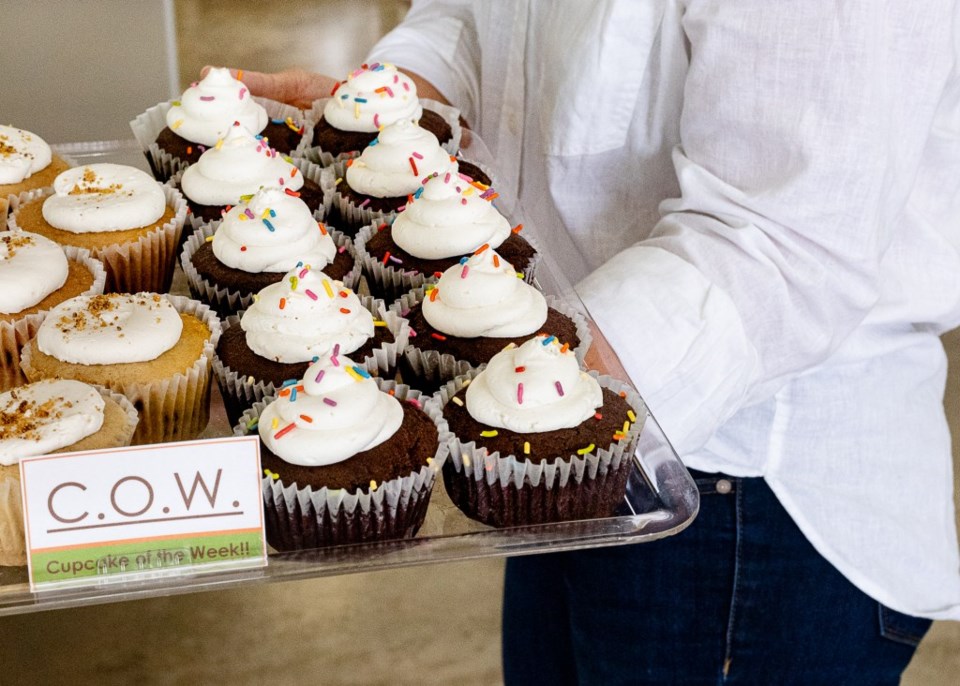
Co-owner Taylor Nicholson offering Unrefined Bakery’s C.O.W. Photography by Sher Castellano
Mother-daughter duo Anne Hoyt and Taylor Nicholson understand the need for vigilance. Both have celiac disease — and together, they opened up Unrefined Bakery in 2010. Now, with six locations in the DFW area and an expanded product line, they reach nearly everyone on the specialized diet spectrum. According to Nicholson, “We serve a lot of people with allergies, but we also serve a lot of people who are keto, paleo, vegan — we see it all.” And you can tell that excites her as she buzzes around the busy storefront, tidying up displays, helping customers and assisting her employees. “I don’t have too much quit in me,” Nicholson says — which is great because what Unrefined Bakery is doing is really something special.
Unrefined Bakery operates out of a 100% gluten- and soy-free facility; 99% of its products are corn- and dairy-free and 80% are egg-free. It also offers products free of nuts, tapioca, grains, sugar and yeast. The range is impressive, and it’s remarkably delicious.
Mariel Street, the co-founder of Liberty Burger, didn’t necessarily intend to have gluten-free or vegan options on the menu when her first location opened in 2011, but with a heart rooted in hospitality, it’s inevitable it happened this way. After receiving requests for gluten-free buns in 2012, she decided to put one on the menu, and the response was a positive one.
Street continued to listen to feedback, learn and provide solutions. And as a result, Liberty Burger was one of the first Texas locations to offer a gluten-free, vegan Impossible Burger to its diners. “If there’s ways we can improve, or if there’s fantastic products out there that we should carry, I want to know because I care about improving my customer’s experience,” says Street.
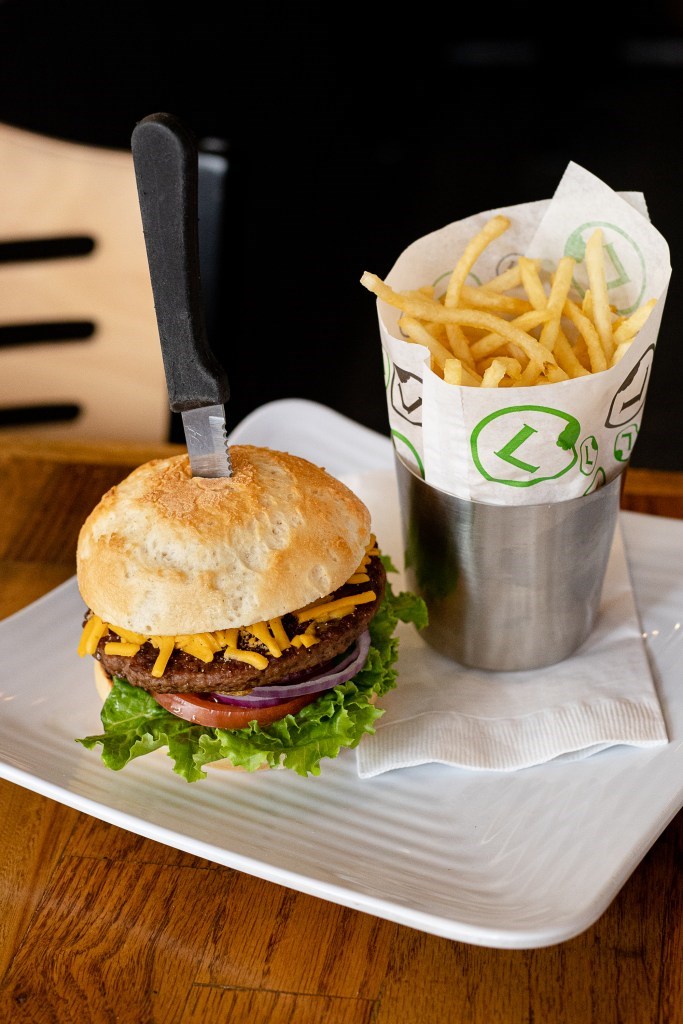
Impossible Burger on a gluten-free bun with fries at Liberty Burger. Photography by Sher Castellano
Liberty Burger, with five North Texas locations, offers shoestring and sweet potato fries cooked in a dedicated fryer that is kept free of gluten and animal products — a very big deal to those staying vigilant to avoid specific cross-contamination.
In their purest form, potatoes are free of the nine major food allergens, naturally vegan and revered for their ability to satiate and comfort affordably. But once those plain raw potatoes touch hot oil, all bets are off for people consuming specialized diets if they aren’t aware of the foods that were previously fried in the same oil.
For folks who have more flexibility to choose what they eat due to a more easily accommodated intolerance or lifestyle decision, dining out might not feel so heavy or complex. North Texan vegan blogger De Ava Lott of @planttemptations explains, “I prefer my food to be prepared separately from non-vegan dishes; however, it’s not always possible. For me, vegan food cooked in the same oil as meat is still considered vegan because I’m not intentionally consuming animal products.”
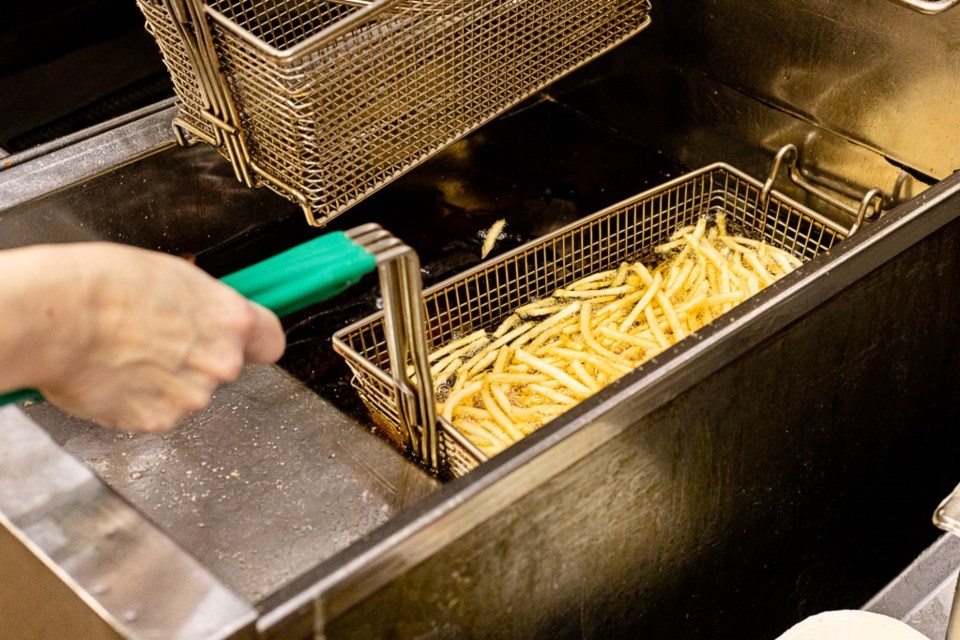
Fries cooking in a dedicated gluten-free fryer at Liberty Burger. Photography by Sher Castellano
And while her approach isn’t one size fits all, it does illustrate the flexibility a person without food allergies might have. “My advice to anyone transitioning to veganism is to take it easy on yourself,” she says. “At some point, you may accidentally consume an animal product. Don't be too hard on yourself, learn from it and keep moving forward.”
Which is a solid reflection for us all. The reason a person eats the way they do, and the varying degrees of free will they have while doing so directly impact their experience while dining out. And while many improvements in the world of specialized diets have been made, there’s always room for more. So whether you’re dining out or have a hand in preparing the food for those who are, give yourself grace, stay safe, continue to learn from your mistakes — and keep eating.

